Electrolytes for Runners
- April 8, 2019
- Last Updated: February 24, 2025
- 45 Comments
- Sports Nutrition
What’s the best electrolyte drink? What about the best electrolyte supplement I should be taking? Let’s review why electrolytes for runners are so important.
As an Amazon Associate, I may earn from qualifying purchases. You can read more here about our Disclaimer and Privacy Page.
Electrolytes for runners is a topic that often comes up in my counseling sessions, especially when discussing nutrition tips for runners.
We seem to know about hydration, but little about the importance of electrolytes.
We cover Hydration and Electrolytes IN DEPTH in our performance fueling course, so check it out.
And then there are questions like, “What’s the best electrolyte supplement,” or “what’s the best electrolyte replacement for runners?” or “do I need a natural electrolyte drink?” so let’s dive into those.
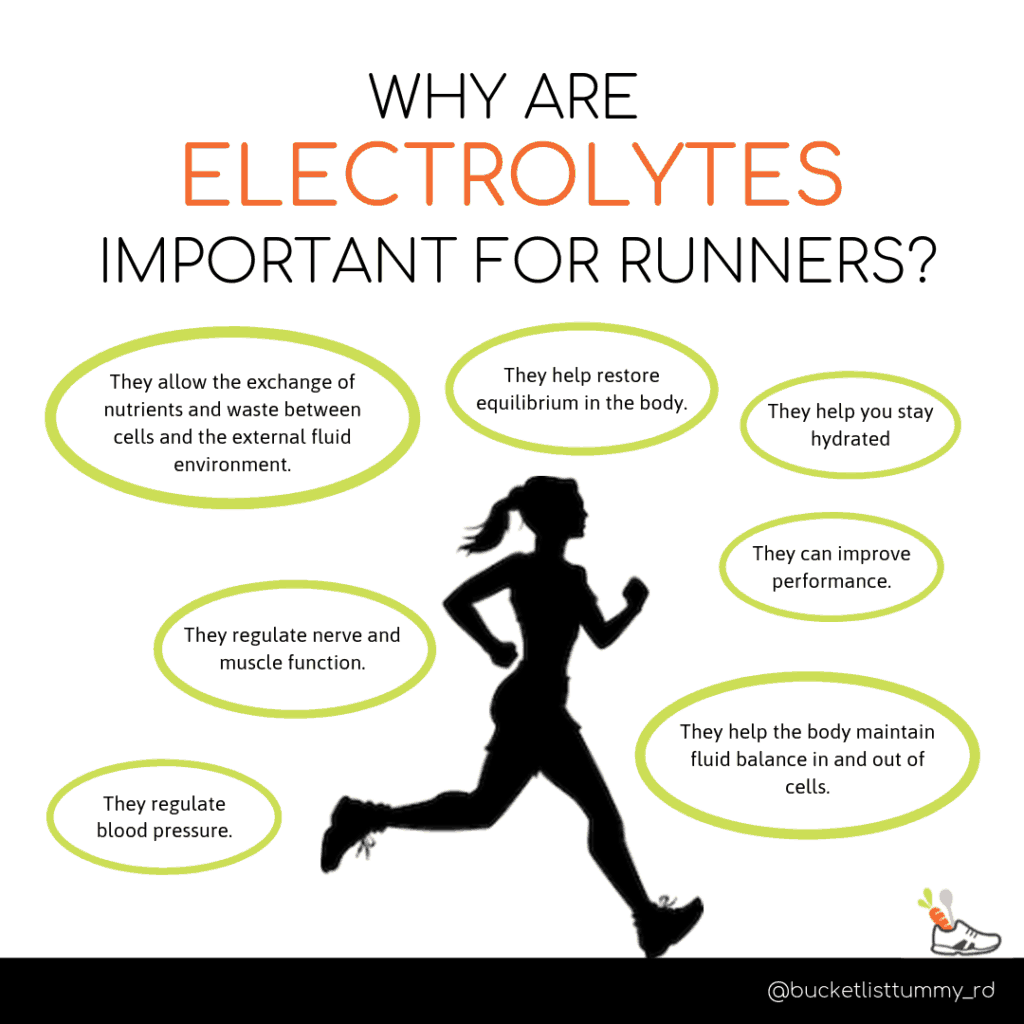
Many of us exercise outdoors and as the weather warms up, I thought it would be helpful to talk not only about the importance of hydration but the importance of adding in electrolytes as well.
Warmer weather puts us at a higher risk of losing more electrolytes through sweat.
I’m also very conscious of my electrolytes when pregnant and breastfeeding since they aid in hydration.
Hydration for breastfeeding is so important for a mom! Here is more information about drinking electrolytes while pregnant.
What Are Electrolytes?
When we talk about the best electrolytes for runners, we’re talking about the minerals found in our blood, urine and body fluids. Electrolytes produce electrically conducted solutions when dissolved in liquid.
There’s not just one best electrolyte supplement for runners.
There are many options for runners electrolytes and you’ll have to find what works for you. You can even follow this post to learn how to make your own electrolyte drink.
Why Electrolytes Are Important For Runners
Running and electrolytes go together.
The bottom line is that an imbalance of electrolytes will not only affect performance, but may also affect other body conditions more seriously, like blood pressure and muscle contraction.
- Allow the exchange of nutrients and waste between cells and the external fluid environment
- Improve performance
- Help restore equilibrium in the body
- Helps body maintain fluid balance in and out of cells
- Can help moniter and decrease muscle cramping
- Regulate nerve and muscle function
- Regulate blood pressure
A DIETITIAN IN YOUR POCKET?!
Are you always hungry?! This is the sports nutrition resource you’ve been missing in your training and every day life. Here’s you can make sure you’re eating enough for daily life, performance and recovery. – grab it now!
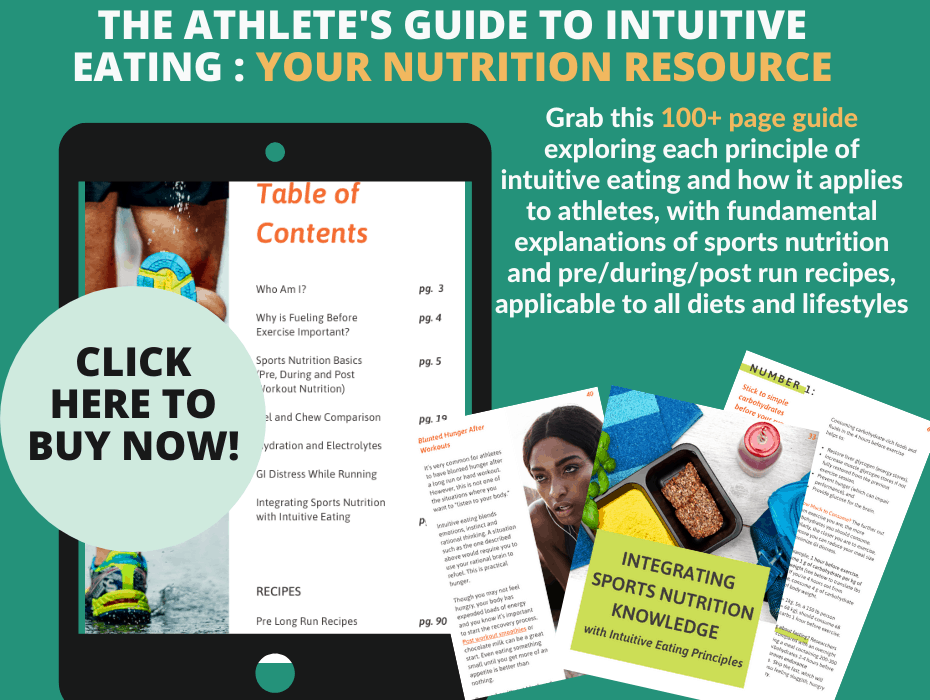
A key takeaway is that after high intensity exercise, or exercise over a long duration, drinking only water is not effective for re-hydration.
For our body to actually retain the water and be able to use it, it must be consumed with electrolytes.
Especially if you’re in marathon training mode, or training for a long distance race, you should be practicing fueling with electrolytes as well as carbohydrates.
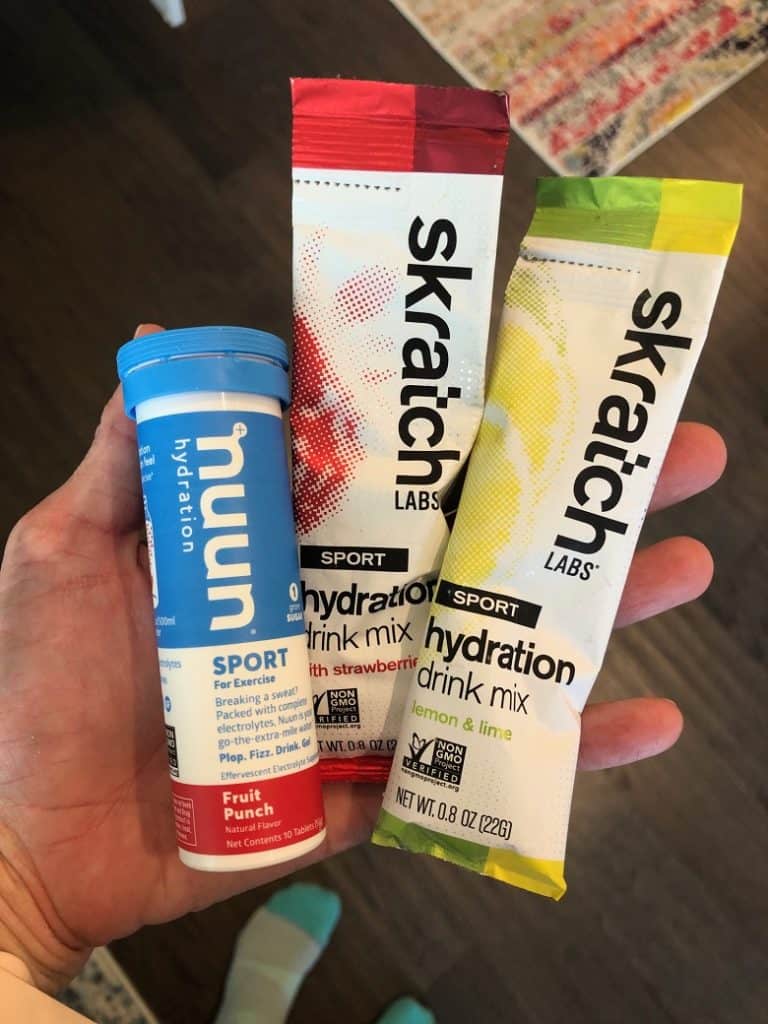
This is absolutely part of nutrition during a marathon and even recovery.
Hydration and electrolytes play a big role in recovery after a half marathon or full marathon. You can even view this half marathon hydration plan as a guide.
Unbalanced electrolyte levels are very dangerous, as I will touch upon below.
They can lead to weak (or severe) muscle contraction and spasms, irregular heartbeats, bone disorders, twitching, seizures, nervous system disorders, blood pressure changes, and obviously, fatigue and lethargy.
Obviously, you can see why having balanced proportions of these minerals is essential!
In my opinion, here’s the best electrolyte powder for runners (go to shop and hydrate for a 10% discount).
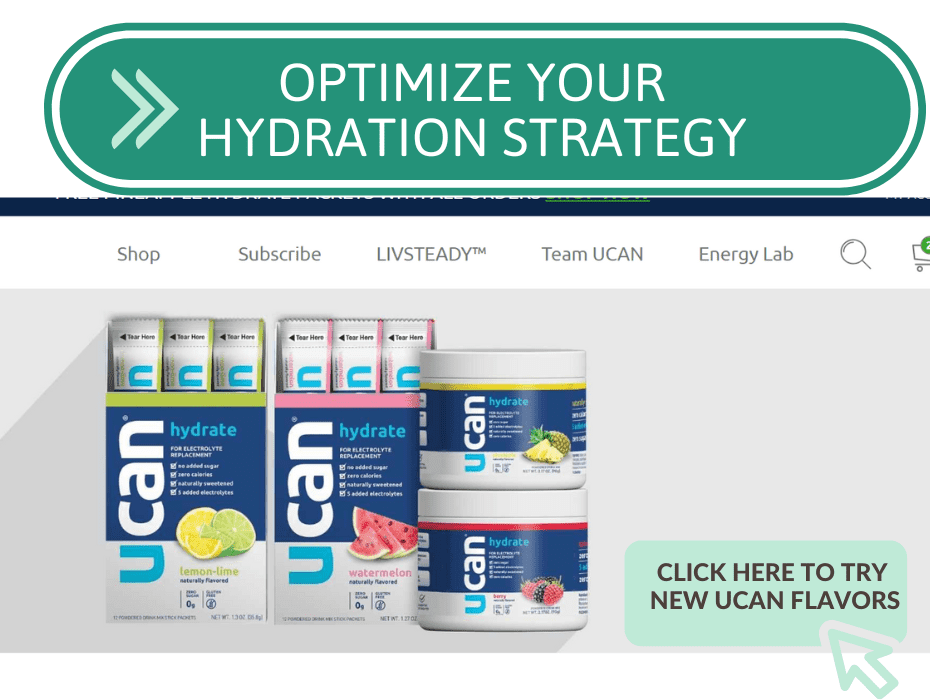
When Should You Take Electrolytes?
You should definitely take electrolytes around exercise, especially. There also may be situations where you take them day in and day out, especially in warmer months or if you are a heavy or salty sweater.
You can take them before, during, and/or after to maximize hydration and nutrition benefits, performance and recovery.
Know that if you ingest excess caffeine for running without adequate fluids, you can throw off your thermal regulation, which may affect hydration.
As we will discuss, you have options to take them in products, and/or replenish them with food, as well. Most people will mix electrolyte products into drinks.
What Are the Main Electrolytes For Runners?
A list of electrolytes (the main electrolytes for running) include:
- sodium
- chloride
- potassium
- magnesium
When we sweat, we lose more than just water. The main running electrolytes we’re referring to through sweat loss are sodium and chloride.
To a lesser extent, we lose magnesium, calcium and potassium as well.
I often get asked about the best source of electrolytes for runners, and I often recommend plain old food or the electrolytes in bone broth for a healthy variety!
However, many products may be higher in certain electrolytes, like sodium (try the watermelon flavor!), that can help more when your GI tract is stressed and it’s hot and you’re exercising.

Let’s review the main ones in further detail and how to replace electrolytes. Not properly replacing electrolytes can be one reason why you may not feel hungry after a workout.
Sodium
Sodium is a primary regulator of our fluid balance. When sodium builds up and our kidneys can’t get rid of the excess, this can lead to high blood pressure, which is a risk factor for a myriad of other health conditions.
Conversely, if we don’t have enough salt in our diets (or we lose excess through sweat), water is drawn out of our cells, which may lead to low blood pressure and/or dehydration.
As I’m sure you’ve heard, the average American gets more sodium in their diet than needed. The American Heart Association recommends 1500 mg/day (just under 3/4 tsp).
Sodium is hidden in packaged foods, soups, breads, cheese, and mixed dishes – this accounts for 75% of the sodium we eat!
However, athletes are different from the general public – we generally need more salt, which is why we’re talking specifically about electrolytes for runners.
Many of these products also make great stocking stuffers for runners!
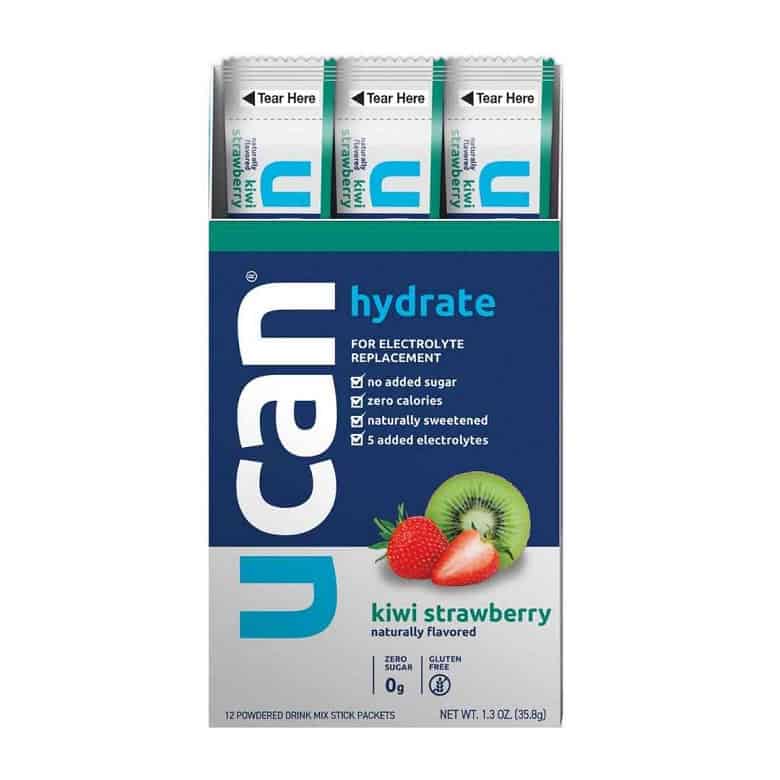
What About Electrolyte Tablets for Runners?
Now, I’m not telling you to load up on packaged foods, but getting enough sodium when you’re exercising intensely or sweating a lot is important.
Many of the gel’s and gu’s have sodium and some electrolytes in them and there are several options of electrolyte tablets for runners.
My personal favorites are the UCAN packets and of course, NUUN tabs or GU tabs. I like both NUUN and GU tabs because they are palatable and I can drink them throughout the day (especially warm days) without stress.
There’s not only one option as the best electrolyte tablets for runners.
If you’re someone who doesn’t like swallowing things or would prefer a spray for your mouth or drink, enduropacks are very popular (important to note that there is less sodium in an enduro pack than in a gel).
An enduropack single spray has about 72 mg of sodium, while a gel usually has 100-150 mg.

Why Do Runners Need to Drink Sports Drinks That Have Sodium and Potassium?
As mentioned above, these electrolytes are important for performance and maintaining hydration in the cells.
However, runners can get them from real foods or electrolyte powders or gels – they don’t solely have to rely on sports drinks.
People often ask me about post run electrolytes. Specific post run electrolyte products are not necessary given you:
- are eating a well balanced diet
- took electrolytes in during your long run and through food
- are not an overly salty sweater
What If You’re a Salty Sweater?
Finally, if you’re a salty sweater, it’s also probably a good idea to consider a salt tablet either instead of regular electrolyte enhancements or in addition to.
These salt tablets are pretty much the best salt tabs for runners that I’ve found.
The Right Stuff is also NSF-certified for sport, which means it has been third party tested and verifies that what’s on the label actually matches the content.
Compared to a bottle of Gatorade which has 280 mg of sodium, The Right Stuff has 1780 mg of sodium!
1 packet of The Right Stuff = 1780 mg vs. 1 bottle (16.9 oz.) Gatorade = 230 mg
Another good option for salty sweaters with higher electrolyte levels is Gatorlytes from Gatorade, which has higher amounts of sodium, potassium and magnesium, all of which can help with hydration and cramping.
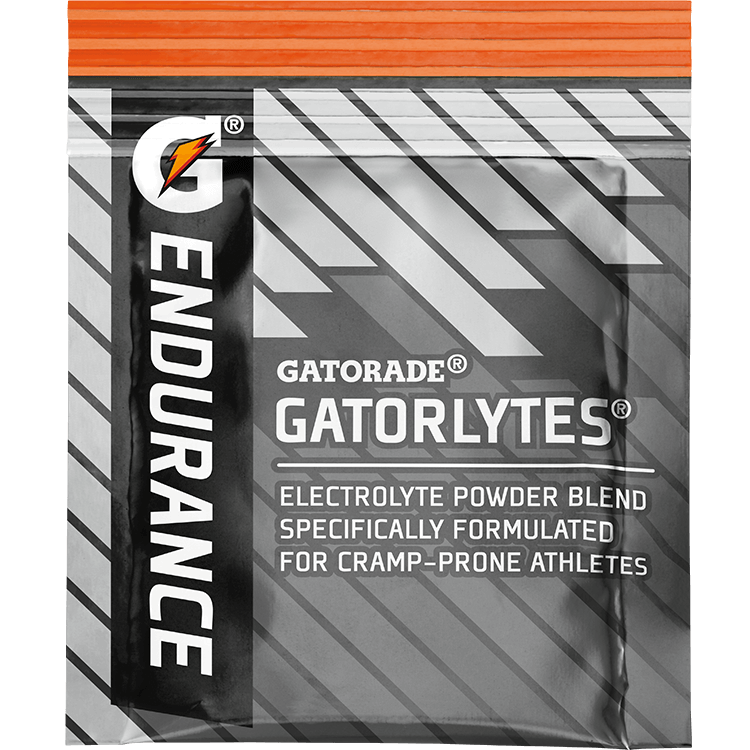
How to Replace Electrolytes: Sodium Rich Recipe Ideas
- Pumpkin Crockpot Chili
- Veggie Pasta Bake
- Almond Flour Banana Muffins
- Healthy Fruit Pizza with Chocolate Peanut Butter Frosting
- Asparagus Mushroom Quiche
- Salted Cinnamon Peanut Butter
Replacing electrolytes doesn’t have to come solely from electrolyte tablets. You can also get “natural electrolytes” by making an easy natural homemade electrolyte drink by adding a pinch of salt, lemonade or juice and honey.
Chocolate milk is another option for a natural electrolyte drink.
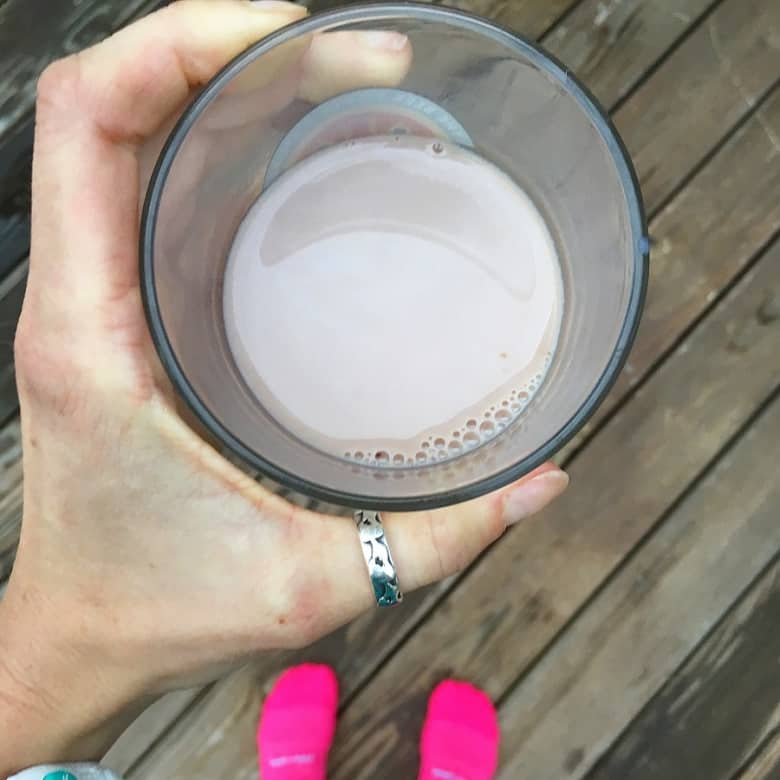
Potassium
Unlike sodium, which is an extracellular electrolyte (outside of the cell), potassium is an intracellular electrolyte, primarily found within the cell. The recommended amount (RDA) is 4700 mg/day.
Having too little or too high levels of potassium (hypo/hyperkalemia) can lead to muscle weakness, cramps, and abnormal heart rhythms.
Most Americans overeat on sodium and undereat on potassium, so including lots of fruits and vegetables is an excellent addition to any lifestyle.
Good sources of potassium are bananas, potatoes, tomatoes, lima beans, winter squash, avocado, and leafy green vegetables.
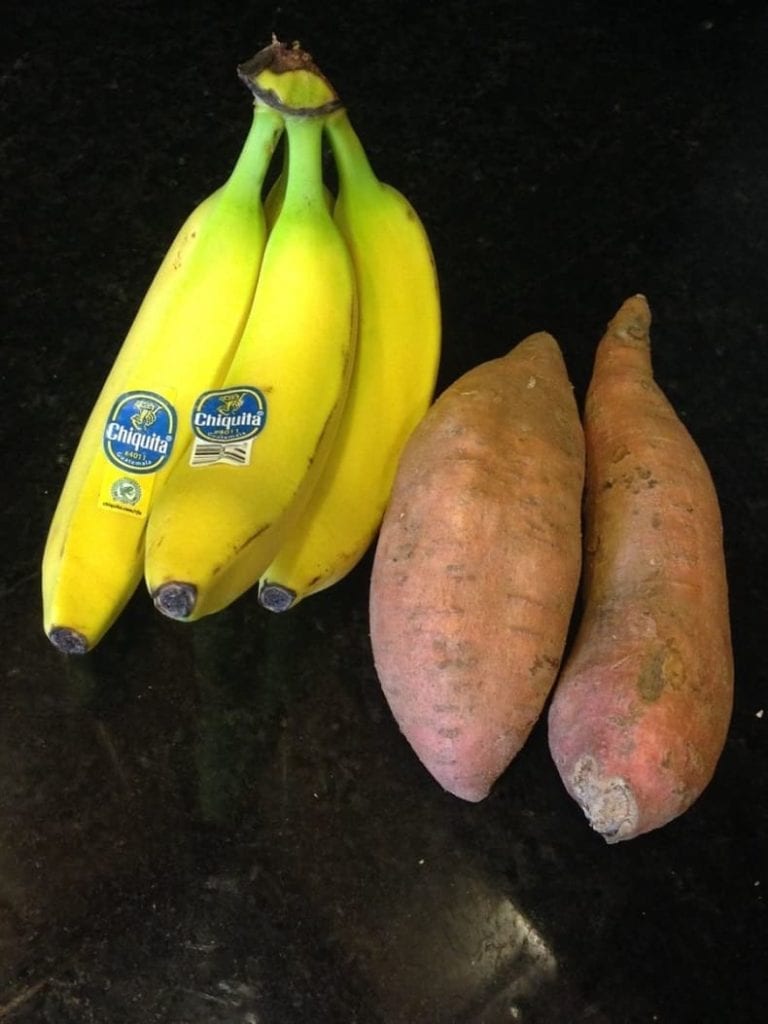
How to Replace Electrolytes: Potassium Rich Recipe Ideas
Magnesium
Magnesium is an intracellular electrolyte that probably deserves more credit than it receives.
It helps the body use energy and is necessary for proper nerve, muscle and enzyme function – it’s involved in hundreds of reactions in our bodies and even helps regulate other minerals (i.e. calcium, potassium, zinc, copper).
For more information about magnesium for runners, check out this post. We also go into the best magnesium supplements for running.
The RDA for adults is 310-420 mg/day.
Magnesium helps the muscles relax (after calcium helps them contract) and is such promoted for relaxation of the body and bowels (it’s a main ingredient in laxatives and Epsom salts).
Get your magnesium through leafy greens, whole grains, seeds, nuts and fortified cereals.
Maple water also has small amounts of magnesium and manganese.
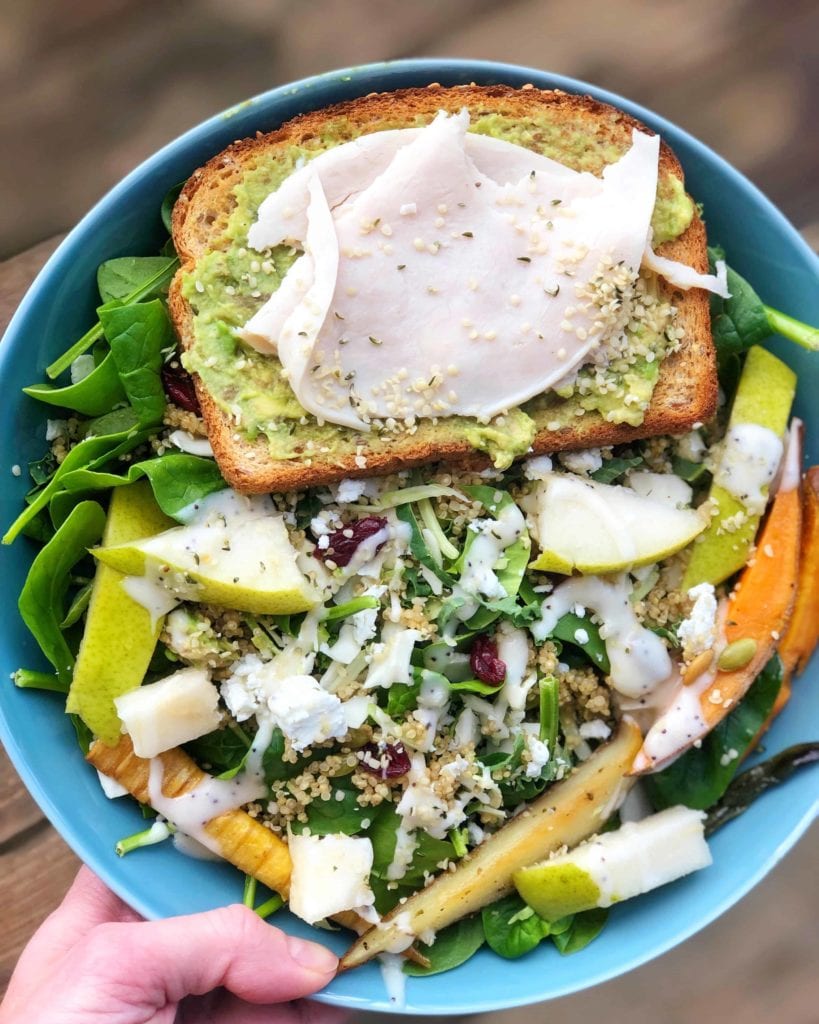
How to Replace Electrolytes: Magnesium Rich Recipe Ideas
- Lime Quinoa Salad
- Squash, Beet and Barley Salad
- Pumpkin Peanut Butter Granola
- Summer Strawberry Chicken Salad
- The Best Homemade Trail Mix
Calcium
Calcium isn’t a major electrolyte we lose through sweat, but still important to be aware of.
While it’s probably most known for its role in bone building and preventing osteoporosis, calcium also helps the muscles contract (important for exercise), helps promote growth, helps blood clotting and helps with hormones.
Our bones have stores of calcium so if our blood levels get too low, our bones release calcium to normalize the levels. The RDA for calcium is 1000-1200 mg/day.
For the best sources of calcium, eat dairy, soy, greens, and canned fish with bones.
You can also get a good chunk of calcium in chia seeds, as well as several other micronutrients. Chia seeds for runners are awesome!
And don’t forget – Vitamin D helps promote the uptake and absorption of calcium!
1 cup of Unsweetened Almond milk has 45% of your RDA of calcium, while 1 cup of low fat cow’s milk has 30% (Note: this may vary by brand).
Dairy and greek yogurt smoothies can also be a great way to get calcium for runners.
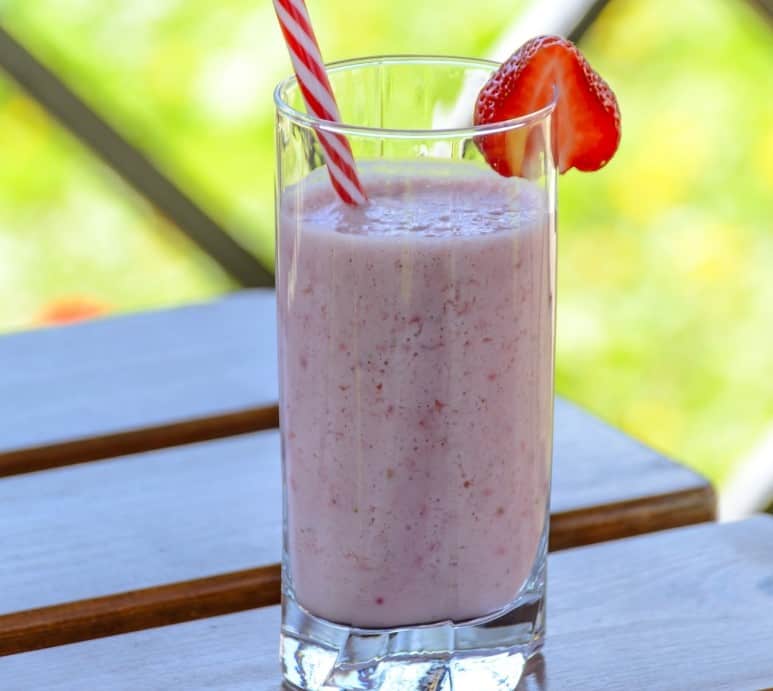
How to Replace Electrolytes: Calcium Rich Recipe Ideas
Natural Electrolyte Drink Options
You don’t just have to rely on sports drinks for electrolytes anymore. It can be so easy to make your own electrolyte drinks for runners.
- 1 cup water/coconut water + 1 T honey + lemon juice + 1/8 tsp salt
- 1/2 cup orange juice, 1/2 cup water, 1 T sweetener, 1/8 tsp salt
- 2 cups water + 1/2 cup orange juice + 1/4 tsp salt + lemon or lime juice + 2 T maple syrup
The best way to replace electrolytes after exercise is by consuming electrolyte-enhanced beverages and/or food.
If you want natural food options for running, check out this list.
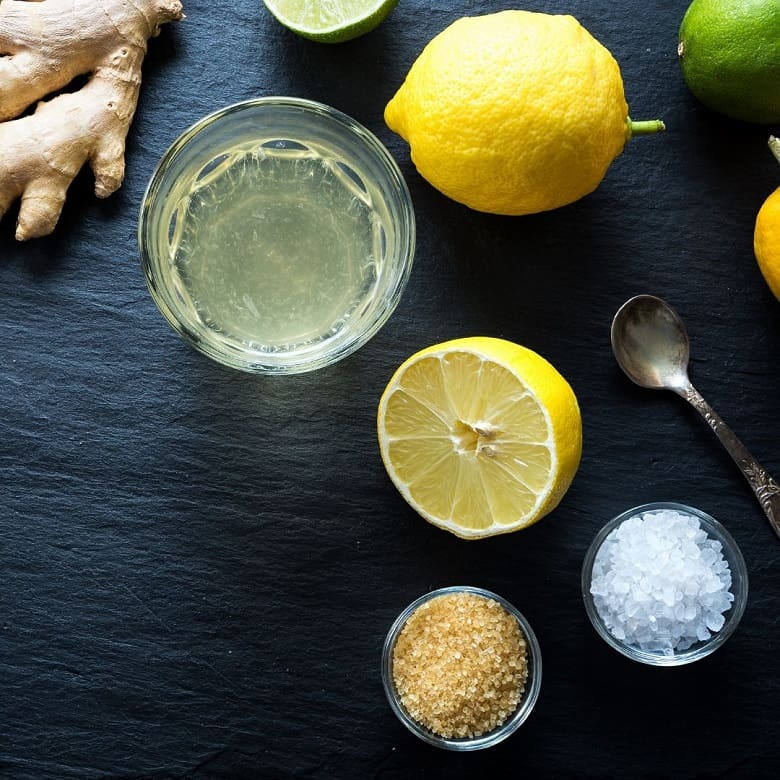
The Best Electrolyte Drinks for Runners
The best electrolyte drink for runners is one you will actually rehydrate with and drink.
To stay safe, replace fluids and electrolytes when you’re exercising even if you’re not thirsty. By the time you realize you’re thirsty, it’s often too late and dehydration has already struck.
It’s recommended that if exercising for an hour, one should consume a minimum of 20 to 40 fluid ounces per hour.
You should replace lost electrolytes at a rate of 200 to 500 mg per hour if hydrating at the recommended rate.
Just make sure to add in electrolytes for those longer runs and workouts to ensure the water can be efficiently used in your cells. Remember, your performance will suffer without adequate electrolyte levels!
Another way to get natural electrolytes is through these tart cherry gummies that are homemade and super easy!
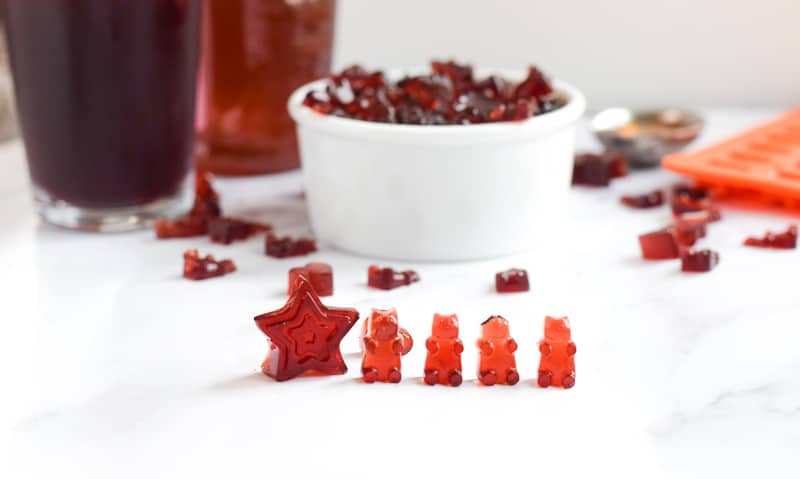
How Do Our Bodies Keep Electrolyte Levels Balanced?
Our bodies are super smart. Under normal conditions, our kidneys will filter out any excess levels of electrolytes. However, if we fall out of balance or don’t consume the necessary levels of electrolytes, we may experience consequences.
The most serious being hypernatremia (too much sodium) or hyponatremia (too little sodium).
One can also experience hyperkalemia (excessive potassium) or hypokalemia (low potassium levels).
The good news is many foods like leafy greens, whole grains, and fruits and vegetables, provide multiple minerals and electrolytes. This is why a varied diet is important, and why we don’t need to only rely on the “best electrolyte supplement.”
Electrolytes for runners are so important, no matter how you get them in. The best electrolytes for running are the ones you actually take in!
More Nutrition Posts for Runners
Support Bucket List Tummy

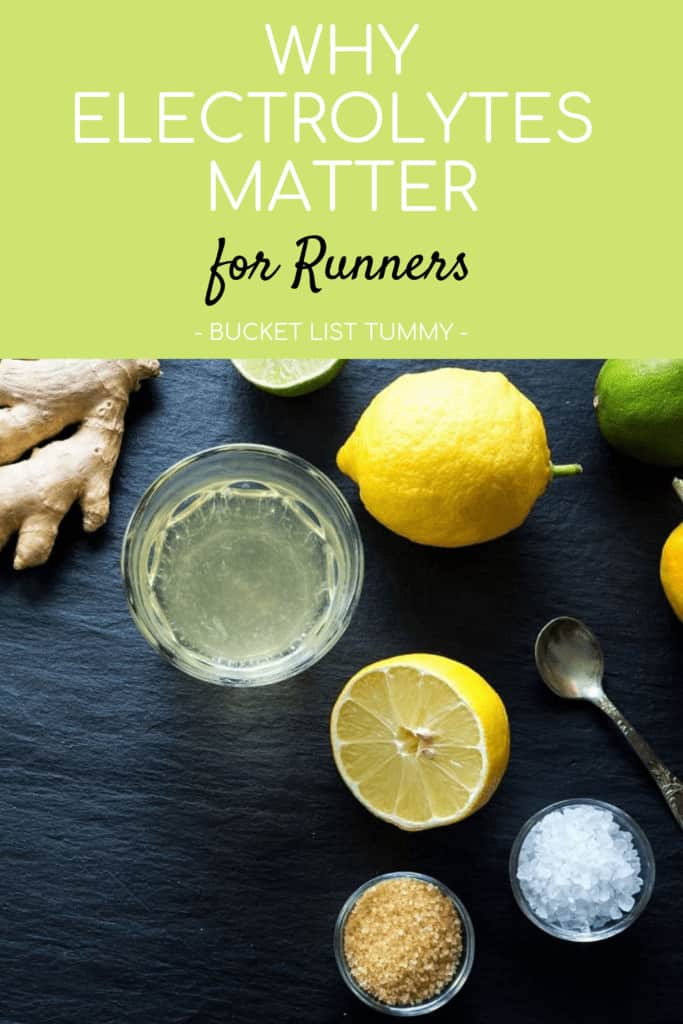


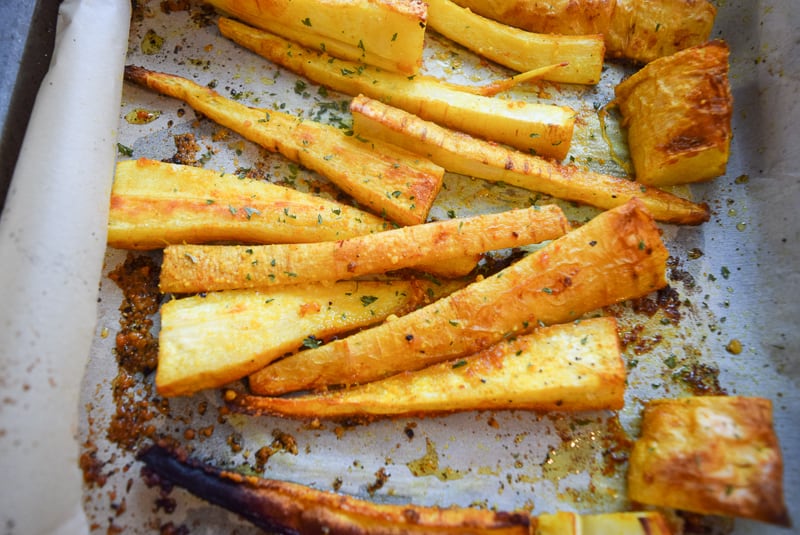
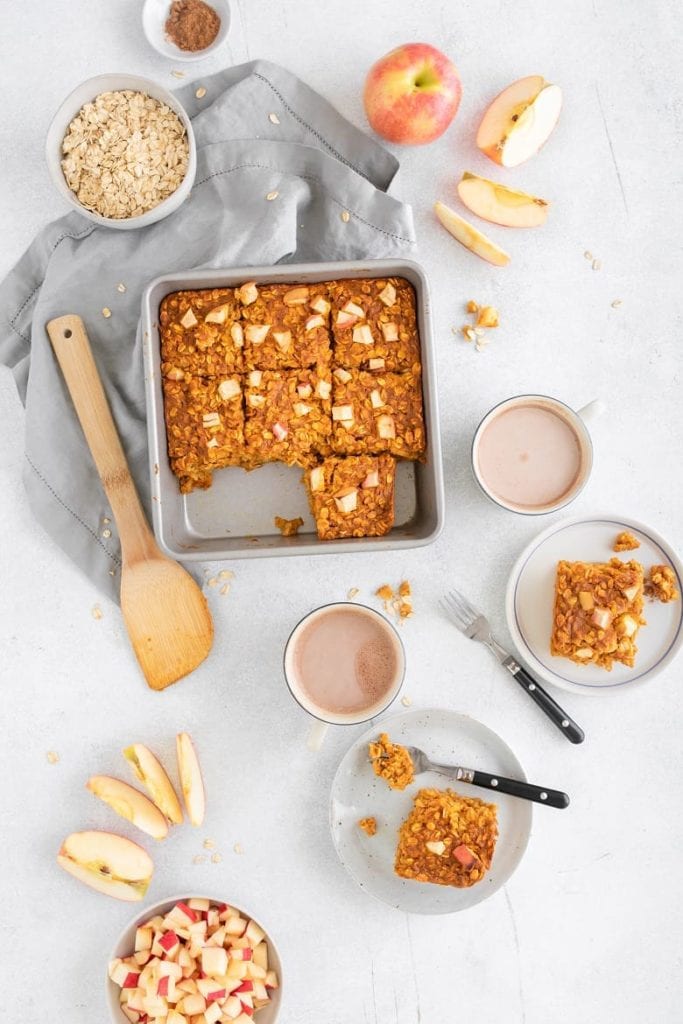

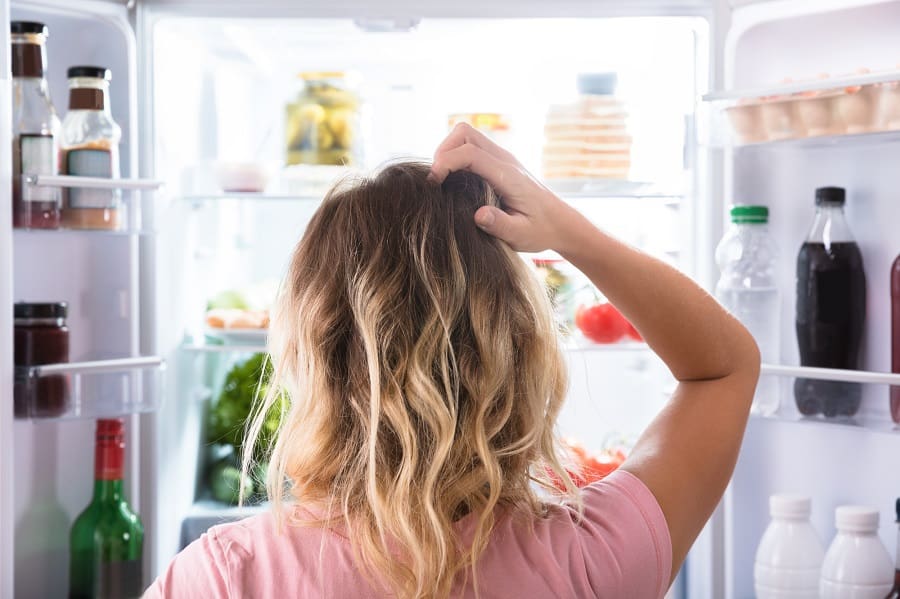


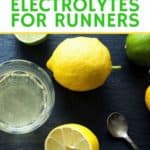
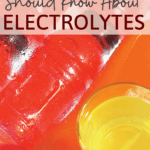
Like This Content?
Support Bucket List TummyWow! This post is packed with so much valuable information. Electrolytes are essential to maintain a healthy body and lifestyle. You give a good insight here as to the different kind of forms electrolytes take. A lot of people may not realize the different sources of electrolytes that are out there, so this was a really informative read! Nicely done!
Great post! Some of us sweat more than others too (like me!). After being plagued with cramps during races, I finally tried Saltstick electrolyte capsules. They definitely help during a race. I love just about all veggies and have no problems getting the recommended requirements. I do pay consume more potassium rich foods when leading up to a race. Thanks for linking with us Sarah!
This is perfectly explained – really great job!
I remember in high school having to take salt tablets when we would have 2-a-day softball practices in August. I’d get killer headaches! Now days, I probably could use more potassium. I love my daily Natural Calm for extra calcium and magnesium before bed. It definitely makes a difference for recovery.
I agree on Denver being tricky. You don’t sweat much here because it’s not that humid, but getting in the water is important because it’s so dry. I think I haven’t been as vigilant about electrolytes in exercise, and I need to keep this in mind. :))
Love the detail and science-y tone of this post! Thank you for providing such a clear explanation of electrolytes. I struggled in my first marathon possibly due to electrolyte imbalance (it was “hot” for fall in the PNW, which means it was in the 60s ha) and have prioritized them since then. I love Enduropacks for training and either that or Nuun if it’s available for racing!
Great article and with the temps on the rise this came at a good time for reminders to drink drink drink!
I always seem to do better in the hotter months with my water intake just because I am more thirsty. I drink Nuun a lot, since I’m an ambassador but also cause I like it.
It’s the dry weather and the cooler months where dehydration can sneak up on us. But the hotter months definitely require more attention to drinking more
This is a great post! I live in San Diego and sometimes have no choice but to exercise when it’s 80-100 degrees out! Staying hydrated before, during and after workouts is so incredibly important!
SO INCREDIBLY IMPORTANT!
Any thoughts on Salt Caps or Salt Sticks? I haven’t used them, but heard of so many people who do. I thought they might be a good option for those of us who are very salty sweat-ers. Which I know that I am. Seems like they might be easier on the stomach to take than a gel?
Is it necessary to replace all electrolytes while running or is sodium the big one & all others can be balanced with a varied // normal diet?
You talk about 20-40 oz of water per hour, what would your hydration strategy for a half marathon or 10K look like then? Does this theory change for things like races?
I really like your more RD oriented posts. There are a lot of things you talk about that I would never think to ask about or research myself until I see you open the dialogue.
If you’re a salty sweater, I would definitely recommend salt tabs, at the very least. Sodium is probably the most important, but all have purposes to keep your body functioning and able to perform! Hydration can definitely be individualized and can change for different races/distances, and with what fuel you’re taking in also.
so it’s probably a good idea to drink some electrolyte drink during my first marathon? I’ve just been doing Honey Stingers and water. Would that work?
Definitely! I think some of the honey stingers have some, depending on what products you’re using. Look for sodium and potassium, especially!
Awesome post, thanks for the info! I’ve never thought too much about electrolytes as my activity level is not very intense on a daily basis, I exercise more moderately and I think I can replace those electrolytes with food!
Would there not be a concern for an average person to consume those electrolyte gel packs? That would seem to just add on to the sodium being consumed, or do the benefits outweigh the sodium content?
If you’re not super active or sweating alot, I don’t think additional electrolyte gel packs would be necessary for you, especially if you get alot of electrolytes (particularly potassium) in your diet, which I’m sure you do. If you’re a salty sweater, though, it wouldn’t hurt to add a salt tab or NUUN tablet to your water every so often.
I really like the sciency posts, I love learning and nutrition and health science interests me so much!
We’re totally on the same page 😉 #Nerds
Great info! It hasn’t gotten hot here yet but hopefully summer is coming soon. I love noun and drink it just about every day!
Me too – it’s a great product!
I played a soccer tournament in Arizona in the middle of summer. Not one of my finer moments. I not only become dehydrated but also got heat stroke and blacked out. Oops! I guess 4 games of soccer in 100 degree weather will do that! My mom started packing me some electrolyte gel packs after that so that she could toss me one as I was running by on the field. They helped!
Oh gosh, that is scary! Definitely a great lesson about the importance of hydration and electrolytes
I’m pretty good about hydrating in warmer temps but forget about it when it’s colder out. I need to get in the habit of carrying my handheld with me on long runs regardless of the temps outside. I love using Nuun tablets for hydration!
I forget in the colder temps too, which is deceiving. Nuun is the best!
Great post – super informative! I try to replay electrolytes naturally – i.e. using food. I’m a little weary about using different supplements.
Whole food is the best way to go! Although it can be tough during a run or workout, I agree with you about the natural replacements.
This is great! I always knew I was “supposed” to consume electrolytes, but never really knew why. Especially living in Denver, where I feel like I can’t get enough water as is, I’ll definitely pay attention to this when I’m working out.
Thanks for the tips and for passing along your smarts. 🙂
XO, Jessica
Aaaaaaand, sorry for the duplicate comment, baha!
This is great! I’ve always known that I’m “supposed” to have electrolytes, but never really knew why. Living in Denver, where every day is dry and I feel like I can’t drink enough water, this will absolutely be something I pay attention to when I’m working out.
Thanks for the tips and for passing along your smarts. 🙂
XO, Jessica
Denver is so tricky. I remember visiting there and not thinking I was ever sweating because it is so dry. Definitely make sure to sneak some electrolytes in with your water! 🙂
Great post! Staying hydrated is something I need to work on. I work out 5 days a week, but don’t get nearly enough electrolytes, so thanks for the 411! Cheers!
I’m glad you found it helpful!
I try to be much more aware of this as the temps start to heat up especially on long bike rides. good info!
Me too! The heat makes things difficult.
Is coconut water good to drink if you’re really dehydrated after a workout? I try to stick to regular water but have heard that coconut water can be even better when you need to re hydrate quickly.
It can definitely provide some electrolytes that plain water can’t. I would just be mindful that it does have some sugar and calories can add up quickly, but I like a little bit of coconut water after a long workout!
Good point! Thank you!! 🙂